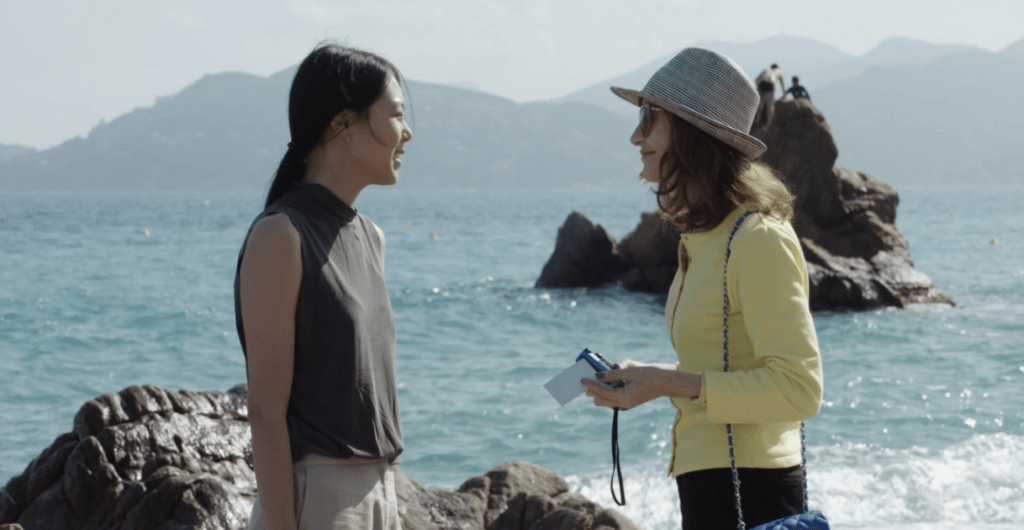<p>As an avid fan of <a href="https://philosophyinfilm.com/?s=Isabelle+Huppert">Isabelle Huppert</a>, I can say with confidence that she (and many great talents) don’t always lend their abilities to the best films. For example, <a href="https://philosophyinfilm.com/2017/07/09/review-valley-of-love-2015-%e2%98%85%e2%98%85%e2%98%85/"><em>Valley of Love (2015)</em></a> should have been a masterpiece. In the film, Huppert and Gérard Depardieu reunite after the suicide of their late son. What should have been a great character study starring two great actors devolves into cliches about the difficulties of marriage and parenthood. Fortunately, Isabelle Huppert didn’t make the same mistake when she teamed up with South Korean director Hong Sang-Soo for <strong><em>Claire’s Camera</em> (2017)</strong>.</p>



<p><em>Claire’s Camera</em> represents the second time Isabelle Huppert and Hong Sang-Soo have worked together. The film is a spiritual successor to their first outing, <em>In Another Country </em>(2012). Both films feature Huppert drifting from one seemingly banal situation to another, abruptly changing between English, French, and Korean. Miscommunications abound, but not for comedic effect (at least not ostensibly). Instead, both films portray their respective culture clashes in a realistic, almost wholesome way.</p>



<h4 class="wp-block-heading"><em>Claire’s Camera</em> Plot Summary</h4>



<p>In <em>Claire’s Camera</em>, Huppert plays Claire, a mild-mannered but curious high school teacher visiting Cannes, France. She brings along her camera to document the people she meets along the way. Like many of Huppert’s best characters, Claire is simultaneously reticent and up for anything. By pure coincidence, she befriends a young woman named Jeon Man-Hee (Kim Min-Hee) who recently lost her job. Man-Hee’s boss fired her while the two enjoyed a cup of coffee, but refused to give any reason for the sudden dismissal.</p>



<p>Claire is charmed by Man-Hee’s personality and beauty, prompting her to take pictures of Man-Hee as they get to know one another. As the story progresses, we learn that Huppert has actually met Man-Hee’s former boss, Nam Yang-Hye (Chang Mi-Hee) and the film director with which both women worked, So Wan-Soo (Jung Jin-Young). Through various revelations and chance meetings, Claire learns that Man-Hee slept with So Wan-Soo, angering her boss, who had maintained a secret, but somewhat one-sided affair with the director for years.</p>



<h4 class="wp-block-heading">Analysis: Realism Overshadows a Minimalist Plot</h4>



<figure class="wp-block-image size-large"><img src="https://i2.wp.com/philosophyinfilm.com/wp-content/uploads/2020/05/Clares-Camera-2018.jpg?fit=800%2C334&;ssl=1" alt="Claire's Camera (2017)" class="wp-image-1843"/><figcaption><em>Claire&#8217;s Camera</em> (2017)</figcaption></figure>



<p>While the plot summary sounds rather dramatic, <em>Claire’s Camera</em> is in no rush to reach its conclusion. Much like <em>In Another Country</em> (2015), director Hong Sang-Soo leaves his actors to do as they wish, more or less. There is certainly a story to follow and I can only imagine that Sang-Soo gave stage directions and notes to his actors. That said, the actors look like they&#8217;re just making things up as they go.</p>



<p>The dialogue in <em>Claire’s Camera</em> is naturalistic to the point of being uncomfortable. The actors stutter through their lines. Only scenes in which characters speak Korean feel scripted and planned out. However, for the majority of the film, we listen to Isabelle Huppert speak English with Korean actors. Sometimes, it feels as though they don’t know how to fully express themselves. Other times, it’s as though they’re just making up the dialogue without any direction.</p>



<h4 class="wp-block-heading">Hong Sang-Soo&#8217;s Signature Style</h4>



<p>If the film had been directed by anyone else, it would be easy to dismiss <em>Claire’s Camera</em> as an amateur attempt at hyperrealism. However, this is simply Hong Sang-Soo’s style. He wants to capture his actors as they are. This is why Sang-Soo sought out Isabelle Huppert for two of his films. She has a way of being both natural and unnatural at the same time. Her expressions and reactions border on the bizarre. Meanwhile, it feels as though she begins a sentence without quite knowing how it will end.</p>



<p>It’s difficult to express what it’s like to watch <em>Claire’s Camera</em>. At times, you’re inclined to laugh or feel embarrassed. Other times, you’re completely transfixed with the most mundane of interactions. Sang-Soo has the unique ability to make great films with very little plot progression. You don’t come out the other side feeling as if you’ve learned something, but you come out knowing that you’ve seen something truly remarkable. </p>



<h4 class="wp-block-heading">Conclusion ;</h4>



<p>Though I don’t think <em>Claire’s Camera</em> lives up to its predecessor, <em>In Another Country</em>, it uses the same devices to make for a completely unique viewing experience. Dialogue meanders without a clear direction, while great actors do their absolute best to keep conversations going. It sounds like a recipe for disaster, but it works surprisingly well. As an added bonus, Sang-Soo shot on location in Cannes, setting his actors against beautiful beaches and enchanting French cafes.</p>



<p>It may not be one of Hong Sang-Soo’s best films, but it is certainly worth a watch for anyone who enjoys Isabelle Huppert, Hong Sang-Soo, and awkward, improvised conversation.</p>



<p>Rating: ★★★½ out of 5</p>



<p>If you’d like to watch<em> Claire’s Camera</em> (2017), the movie is currently available to purchase <a href="https://www.amazon.com/gp/product/B07GW3JN5S/ref=as_li_qf_asin_il_tl?ie=UTF8&;tag=mjones34880c-20&;creative=9325&;linkCode=as2&;creativeASIN=B07GW3JN5S&;linkId=252b02823f90527569abd7e26ac2fd7b">via Amazon</a>. For more reviews like this one, check out the <a href="https://philosophyinfilm.com/">Philosophy in Film Homepage</a>!</p>

Review: Claire’s Camera (2017) ★★★½

